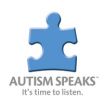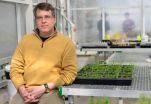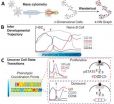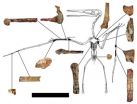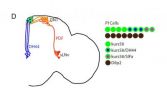(Press-News.org) NEW YORK, N.Y. (April 24, 2014) – A new study from investigators with the Autism Genome Project, the world's largest research project on identifying genes associated with risk for autism, has found that the comprehensive use of copy number variant (CNV) genetic testing offers an important tool in individualized diagnosis and treatment of autism.
Funded primarily by Autism Speaks, the world's leading autism science and advocacy organization, the Autism Genome Project involved more than 50 research centers in 11 countries. The report, published today in the American Journal of Human Genetics, delivers on the 10-year project's objective to provide practical methods for earlier diagnosis and personalized treatment of autism.
"With the publication of this study, we should step back to recognize and celebrate the pioneering achievements of the AGP and what they have accomplished in helping to launch the field of genomic risk discovery in autism," says Autism Speaks Chief Science Officer Rob Ring. "The AGP has generated information that holds the potential to guide medical care for certain individuals with autism today. They have demonstrated that science can work for families, and Autism Speaks is proud to have been a supporter of the work all along the way."
The study involved CNV testing of 2,446 families affected by autism and 4,768 individuals unaffected by neurologic or psychiatric disorders. Overall, CNVs were significantly more common in the participating families affected by autism. And, the CNV testing uncovered dozens of cases where autism-linked gene changes were associated with additional health risks warranting medical attention.
In nine of the families affected by autism, CNVs involved a gene that indicates elevated risk for seizures and epilepsy. "This result warrants an immediate referral to a neurologist," explains senior author Stephen Scherer of the Toronto's Hospital for Sick Children and the University of Toronto. Similarly, CNV testing indicated a high risk for muscular dystrophy in several of the autism families and identified syndromes associated with heart problems in others.
CNVs are genetic changes that involve duplication or deletion of entire segments of DNA. They do not typically show up on standard genetic tests which search for "spelling mistakes" in the DNA letters that compose a gene. Those standard tests identify a clear genetic autism link in only 15 to 20 percent of the cases.
"This report and its extensive supplements should become a new guidebook for medical geneticists working with families affected by autism," Dr. Scherer says.
In addition, the study added dozens of genes to the growing list of those that contribute to the development of autism. Surprisingly, the autism genes identified through CNV testing had little overlap with those detected using standard exome gene sequencing, yet researchers say they affect the same brain pathways.
"These gene discoveries will help guide further research on autism subtypes and their treatment," Dr. Scherer says.
In response, the investigators urge medical geneticists to add CNV testing to the standard gene tests for autism and to consult medical recommendations for the many autism-linked syndromes that CNV testing can reveal. CNV testing is currently available, though it's not typically part of standard genetic testing for autism. Whole genome sequencing is the next step in genetic testing for Autism but is not yet widely available in ordinary medical settings. Autism Speaks has taken a world-leadership position in in this direction with its Autism Ten Thousand Genomes (Aut10K) program.
INFORMATION:
A full list of Autism Speaks research grants supporting the Autism Genome Project is available here. Other project supporters include Ireland's Health Research Board, the United Kingdom's Medical Research Council, the Hilibrand Foundation, the Genome Canada Ontario Genomics Institute and the Canadian Institutes of Health Research.
About Autism
Autism is a general term used to describe a group of complex developmental brain disorders – autism spectrum disorders – caused by a combination of genes and environmental influences. These disorders are characterized, in varying degrees, by communication difficulties, social and behavioral challenges, as well as repetitive behaviors. An estimated 1 in 68 children in the U.S. is on the autism spectrum.
About Autism Speaks
Autism Speaks is the world's leading autism science and advocacy organization. It is dedicated to funding research into the causes, prevention, treatments and a cure for autism; increasing awareness of autism spectrum disorders; and advocating for the needs of individuals with autism and their families. Autism Speaks was founded in February 2005 by Suzanne and Bob Wright, the grandparents of a child with autism. Mr. Wright is the former vice chairman of General Electric and chief executive officer of NBC and NBC Universal. Since its inception, Autism Speaks has committed nearly $200 million to research and developing innovative resources for families. Each year Walk Now for Autism Speaks events are held in more than 100 cities across North America. On the global front, Autism Speaks has established partnerships in more than 40 countries on five continents to foster international research, services and awareness. To learn more about Autism Speaks, please visit AutismSpeaks.org.
Autism Genome Project delivers genetic discovery
Results can impact the lives of people with autism today
2014-04-24
ELSE PRESS RELEASES FROM THIS DATE:
Measles commentary in Annals of Internal Medicine
2014-04-24
1. Measles outbreaks prompt concern about physician knowledge gaps
Vaccination refusal and importation of the disease has led to increased incidence of measles in the United States. Before widespread vaccination, approximately 500,000 measles cases occurred annually, resulting in 500 deaths and 48,000 hospitalizations. Vaccination programs helped to eradicate endemic measles by the year 2000, reducing the median number of cases per year to 60. But in just the first three months of 2014, 106 measles cases were reported, prompting health officials to become concerned. Measles ...
Plants send out signals attracting harmful bacteria, MU study finds
2014-04-24
COLUMBIA, Mo. – When bacteria attack plants, they often inject harmful proteins into the host plants' cells to weaken and suppress natural defenses. However, in some plants, bacteria attack once they've recognized the plant cells as a potential host. Now, researchers at the University of Missouri have identified and replicated the process that allows the bacteria—known mostly for attacking tomatoes—to invade its host. This discovery could lead to natural anti-infective treatments that work with food-producing plants to enhance resistance to harmful bacteria in the field.
"When ...
Genome yields insights into golden eagle vision, smell
2014-04-24
WEST LAFAYETTE, Ind. - Purdue and West Virginia University researchers are the first to sequence the genome of the golden eagle, providing a bird's-eye view of eagle features that could lead to more effective conservation strategies.
Their study calls into question long-held assumptions about golden eagle vision, indicating that the raptors may not be as sensitive to ultraviolet light as previously thought. The genome also suggests that golden eagles could have a sharper sense of smell than researchers realized.
Additionally, the genome provides thousands of genetic ...
International collaboration unravels novel mechanism for neurological disorder
2014-04-24
HOUSTON – (April 24, 2014) – A team of international scientists led by Baylor College of Medicine has discovered a novel gene (CLP1) associated with a neurological disorder affecting both the peripheral and central nervous systems. Together with scientists in Vienna they show that disturbance of a very basic biological process, tRNA biogenesis, can result in cell death of neural progenitor cells. This leads to abnormal brain development and a small head circumference as well as dysfunction of peripheral nerves.
The study published today in the current issue of the journal ...
Researchers create comprehensive map of human B cell development
2014-04-24
New York, NY - In the April 24, 2014 edition of Cell, a team of researchers led by Dana Pe'er at Columbia University and Garry Nolan at Stanford University describes a powerful new method for mapping cellular development at the single cell level. By combining emerging technologies for studying single cells with a new, advanced computational algorithm, they have created the most comprehensive map ever made of human B cell development. Their approach will greatly improve researchers' ability to investigate development in cells of all types, make it possible to identify rare ...
Surprising new insights into the PTEN tumor suppressor gene
2014-04-24
BOSTON – Ever since it was first identified more than 15 years ago, the PTEN gene has been known to play an integral role in preventing the onset and progression of numerous cancers. Consequently, when PTEN is either lost or mutated, malignant cells can grow unchecked and cancer can develop.
Now a team led by investigators at Beth Israel Deaconess Medical Center (BIDMC) helps explain more precisely how PTEN exerts its anti-cancer effects and how its loss or alteration can set cells on a cancerous course. The new study, which reveals that PTEN loss and PTEN mutations are ...
Researchers pinpoint protein crucial for development of biological rhythms in mice
2014-04-24
Johns Hopkins researchers report that they have identified a protein essential to the formation of the tiny brain region in mice that coordinates sleep-wake cycles and other so-called circadian rhythms.
By disabling the gene for that key protein in test animals, the scientists were able to home in on the mechanism by which that brain region, known as the suprachiasmatic nucleus or SCN, becomes the body's master clock while the embryo is developing.
The results of their experiments, reported online April 24 in Cell Reports, are an important step toward understanding ...
Oldest pterodactyloid species discovered, named by international team of researchers
2014-04-24
WASHINGTON—An international research team, including a George Washington University (GW) professor, has discovered and named the earliest and most primitive pterodactyloid—a group of flying reptiles that would go on to become the largest known flying creatures to have ever existed—and established they flew above the earth some 163 million years ago, longer than previously known.
Working from a fossil discovered in northwest China, the project—led by University of South Florida (USF) paleontologist Brian Andres, James Clark of the GW Columbian College of Arts and Sciences ...
Fruit fly study identifies brain circuit that drives daily cycles of rest, activity
2014-04-24
PHILADELPHIA - Amita Sehgal, PhD, a professor of Neuroscience at the Perelman School of Medicine, University of Pennsylvania, describes in Cell a circuit in the brain of fruit flies that controls their daily, rhythmic behavior of rest and activity. The new study also found that the fly version of the human brain protein known as corticotrophin releasing factor (CRF) is a major coordinating molecule in this circuit. Fly CRF, called DH44, is required for rest/activity cycles and is produced in cells that receive input from the clock cells in the fly brain. In mammals, CRF ...
Scientists find way to target cells resistant to chemo
2014-04-24
Scientists from The University of Manchester have identified a way to sensitise cancer cells to chemotherapy - making them more open to treatment.
The study published today in Cell Reports, could pave the way for the development of drugs to target cells that have become resistant to treatment.
The research team made the discovery whilst exploring the possible mechanisms behind resistance to chemotherapy drugs like Paclitaxel, often used to treat breast and colon cancer.
Dr Andrew Gilmore, who led the research team at The University of Manchester, is part of both the ...
LAST 30 PRESS RELEASES:
Children born with upper limb difference show the incredible adaptability of the young brain
How bacteria can reclaim lost energy, nutrients, and clean water from wastewater
Fast-paced lives demand faster vision: ecology shapes how “quickly” animals see time
Global warming and heat stress risk close in on the Tour de France
New technology reveals hidden DNA scaffolding built before life ‘switches on’
New study reveals early healthy eating shapes lifelong brain health
Trashing cancer’s ‘undruggable’ proteins
Industrial research labs were invented in Europe but made the U.S. a tech superpower
Enzymes work as Maxwell's demon by using memory stored as motion
Methane’s missing emissions: The underestimated impact of small sources
Beating cancer by eating cancer
How sleep disruption impairs social memory: Oxytocin circuits reveal mechanisms and therapeutic opportunities
Natural compound from pomegranate leaves disrupts disease-causing amyloid
A depression treatment that once took eight weeks may work just as well in one
New study calls for personalized, tiered approach to postpartum care
The hidden breath of cities: Why we need to look closer at public fountains
Rewetting peatlands could unlock more effective carbon removal using biochar
Microplastics discovered in prostate tumors
ACES marks 150 years of the Morrow Plots, our nation's oldest research field
Physicists open door to future, hyper-efficient ‘orbitronic’ devices
$80 million supports research into exceptional longevity
Why the planet doesn’t dry out together: scientists solve a global climate puzzle
Global greening: The Earth’s green wave is shifting
You don't need to be very altruistic to stop an epidemic
Signs on Stone Age objects: Precursor to written language dates back 40,000 years
MIT study reveals climatic fingerprints of wildfires and volcanic eruptions
A shift from the sandlot to the travel team for youth sports
Hair-width LEDs could replace lasers
The hidden infections that refuse to go away: how household practices can stop deadly diseases
Ochsner MD Anderson uses groundbreaking TIL therapy to treat advanced melanoma in adults
[Press-News.org] Autism Genome Project delivers genetic discoveryResults can impact the lives of people with autism today
